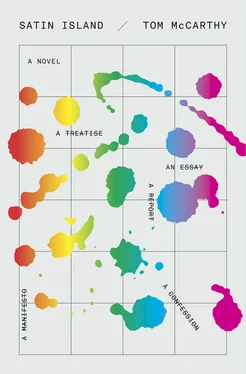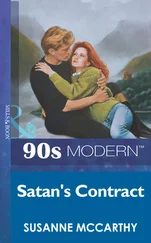9.10As we drove back to the museum, we traded news about our contemporaries from university. A third of them had gone to the developing world, to work for NGOs; another third were, like me, working in the corporate sector; the remaining third were academics. Claudia was the only one to have involved herself with what she again called material culture . As we crossed a bridge in the city’s centre, I could see, on one side of the river, the new headquarters of the European Central Bank being built; on the other, in a row, the town’s museums — all of them: architectural, cinematic, natural-historical and so on — housed, like the anthropological one, in old villas. Further away, spires of cathedrals that had somehow survived wartime blitzing poked out above modern glass and metal. One of the huge cranes building the Bank’s HQ was turning as we drove; the box from which the cables carrying the crane’s load descended was sliding along the jib-arm, which itself was swinging horizontally across the air. The box was sliding fast, and the arm was swinging fast, and we were driving fast as well; and it appeared, just for a moment, that the box, though hurtling along the moving arm, was staying quite still, rooted to a single spot of air. But only from the speeding car, there on the bridge.
9.11On the flight back to London, as the stewardess gave me a cup, or I removed a teaspoon from its packet, or folded down and up the tray-table in the seat-back just in front of me, the term material culture played and replayed itself in my mental airspace, like a snatch of a stuck record. I couldn’t help but see these things — this table, teaspoon, cup — as tribal objects. Also adjustable air-conditioning nozzles, slide-down blinds, Velcro-fitted head-rest covers, motion-sickness bags, buttons with human icons on them and the like. Aliens, after all trace of us has disappeared bar the small handful of our corpses they’ll preserve for intermittent laying out on their tissue-coated slabs, will have whole bunkers full of these things, stuffed into naphthalene-laced cabinets, twenty of each spilling out of every drawer, and wonder what the fuck they were all for. Before we’d left the building, Claudia and I had ducked into the other two rooms, those housing the artifacts from the Americas and Africa. These rooms had been similarly crammed with objects — drums and bracelets, loincloths, Día de los Muertos figurines — but in the second room, the Africa one, a particular item had held my attention more than all the others. It wasn’t, properly speaking, an item: just a lump of some black substance, all unformed, whose rugby ball — sized mass consisted of no more than tubers and protuberances knotted and gnarled together every which way. It’s caoutchouc , Claudia had said, seeing me staring at it: rubber, in its raw form. Now, looking through the window at the bulbous clouds that, once again, were slightly smudged, I thought of this caoutchouc; then of Petr’s cancer; then, once more, of spilled oil.
10.1I spent most of the next week honing in my head the presentation that I should have given back in Frankfurt. Consider, gentlemen, the Oil Spill. Oil spills considered as. Considered as a function of or symbol for. When, gentlemen, we consider. No: Consider, then (yes, then , like the consideration followed naturally from the preceding one — although there wasn’t a preceding one: the proposition just confirmed itself, which made it irrefutable) — consider, then, the Oil Spill. Any oil spill. There’s always one happening … In my mind’s eye, the hi-tech modern conference hall morphed into a nineteenth- or even eighteenth-century auditorium: steep-banked rows of wooden benches, an audience made up exclusively of men with bushy sideburns and high collars, pipe- and cigar-smoke mingling with murmurs of approval in air already thick with erudition and just plain old age — although I still had a projector wi-fi’d to a sensor on my index finger, split-second responsive …
10.2There’s always an oil spill happening, I’d say. Which is why. That’s the reason, gentlemen. Which, gentlemen, is the reason we can name it in the singular: the Oil Spill — an ongoing event whose discrete parts and moments, whatever their particular shapes and vicissitudes ( vicissitudes! I’d susurrate the word time and again), have run together, merged into a continuum in which all plurals drown. Click . Here, gentlemen, you see a tanker trailing its long, black tail. Click . Here are vinyl-coated rocks; and here— click —a PVC-hemmed coastline. Nature got up in her fetish gear, her gimp-outfit. Click . Here’s one showing men with body-suits and gloves pacing a taped-off beach the way forensic detectives do at crime scenes. Click . Here’s a video-file: a close-up sequence, captured by a hand-held underwater camera, of a few feet of seabed. Note the way the semi-hardened oil stretches and folds as the diver’s hand lifts it. Can you see the look on his face? Come, now, come: of course you can. It is the fascinated look your own one had when, as a child, you stood (didn’t you?) rooted to the pavement in front of a candy-store window in which taffy was being pulled, transfixed by the contortions of the unmanageably huge lump — what child, I ask you, gentlemen, could eat all that ? — as the machine’s arms plied it, its endless metamorphoses as. Stretched and folded, stretched and slapped. Alchemy. Metamorphosis. Material culture.
10.3I worked on this imaginary presentation during down-moments: while I was walking around, say, or taking a bath, or staring at Madison’s ceiling after sex, or at my office’s wall during intervals between two bits of proper work — in other words, pretty much all the time. Oil, gentlemen, I’d say, is hydrophobic: it recoils from water. This is not a tendency or quirk of oil: it is an elemental property that defines it at its very core, shaping its micelles, hydrocarbons, atoms. Oil and water, as the old adage goes, do not mix. So what are we observing when we watch these elements con. When we watch them introduced to. When we watch these liquids thrown together? You might say that we’re observing ecological catastrophe, or an indictment of industrial society, or a parable of mankind’s hubris. Or you might say, more dispassionately, that we’re observing a demonstration of chemical propensities. But the truth is that, behind all these episodes. Dramas: be neath these. Beneath all these dramas, I’d say, and before them, we’re observing, simply (gentlemen), differentiation. Differentiation in its purest form: the very principle of differentiation. Ones and zeros, p and not-p: oil, water. Behind all behaviour, issuing instructions, sending in the plays — just as behind life itself, its endless sequencing of polymers — there lies a source-code. This is the base premise of all anthropology.
10.4At this point in these scripted fantasies, I’d pause to take a sip of Evian, or some such. There’d be a hush as delegates waited for me to carry on. A gesture to the screen as I’d name, once more, the substance filling it: Oil — then, smiling, I’d sweep my hand back towards the bottle, and say: Water. The theatrical manoeuvre sucked them in completely: they were mine. Where one is, I’d tell them, the other cannot be. When we encounter, then, as we do often after spills— click —an oily sea, a sea whose body, while it still performs the functions and ceremonies of a sea — flowing, lapping, breaking into waves and the like — has become dark and ponderous, what we’re in fact encountering is not a sea at all. It’s oil that has ousted the sea, usurped it, packed it off into exile and assumed its position. It’s a putsch , a coup d’état . Another pause to let the metaphor take hold. And yet, I’d say (unpacking it into full-blown conceit now), the usurper has kept all the infrastructure of the ancien régime in place, the rules and regulations governing its rhythms and activities. The judiciary and legislature have decided, for their own tactical reasons — for even minerals, gentlemen, display an instinct for self-preservation — to comply fully with the new executive: the same laws of gravity and motion apply as did before; the same day-to-day, minute-to-minute patterns play out as on any other day and as at any other minute; and for many subjects (low-level constituents whose collective toil produces currents, eddies, tides) there’s no sign that the coup has taken place at all. If they do know, they don’t seem to mind; they even seem to welcome the regime-change. And why shouldn’t they? It’s an improvement. Oil has more consistency than water: it is denser, more substantial — and thus brings the latter into its own more fully, expressing the sea’s splendour in a manner more articulate, more something. In a manner more poetic. No, more lyrical: the sea’s splendour in a manner far more lyrical than that in which the original ever did. When you watch swell and surf rolling through a sea that’s turned to oil, is it not like watching the whole process in slow motion? All the grace of a wave rendered through high-end visual software that manages to hold and frame each moment without interrupting or arresting. Something to do with sport: when you can see the football’s backspin. And the net’s grid, exploding. Perfection.
Читать дальше












